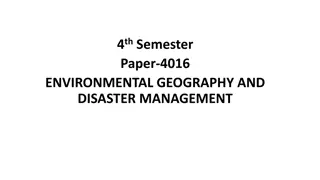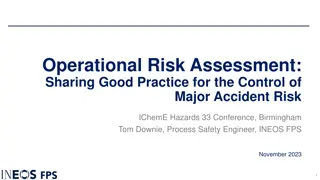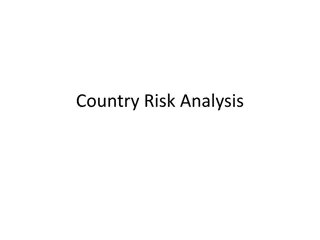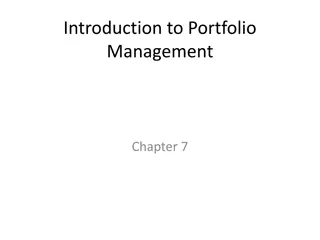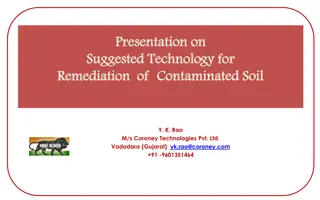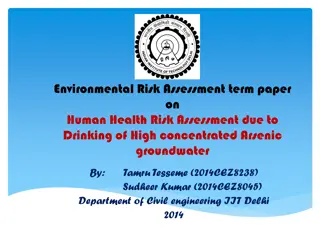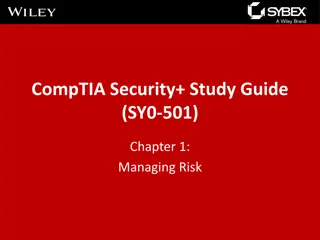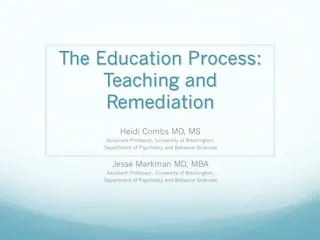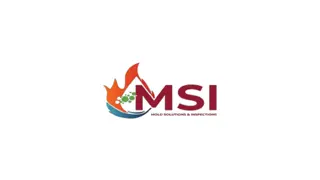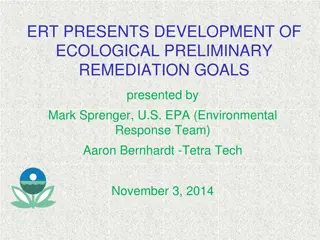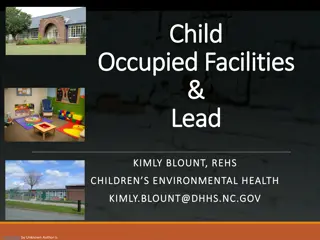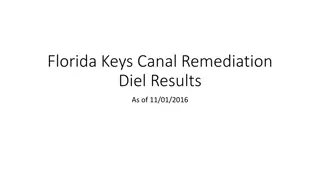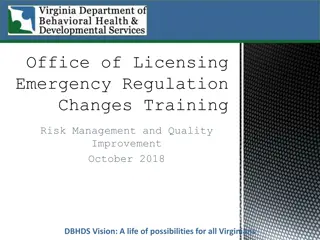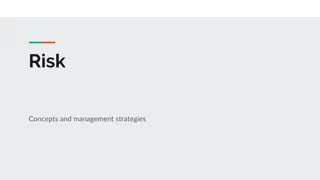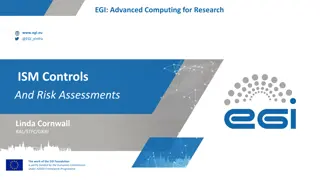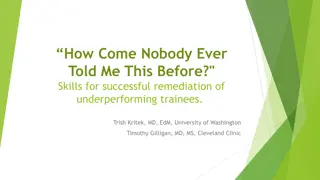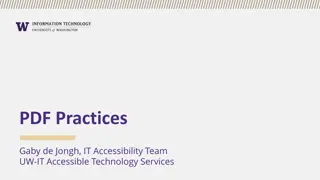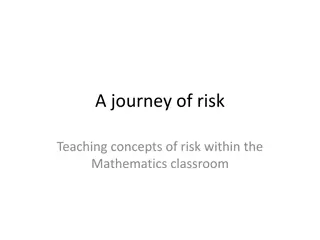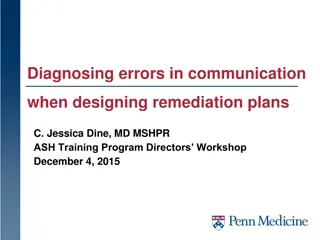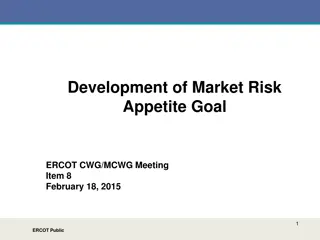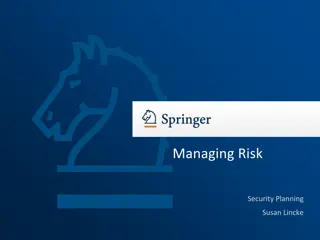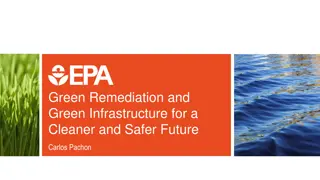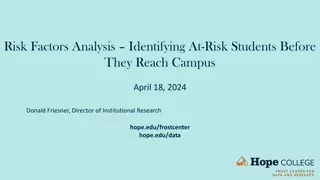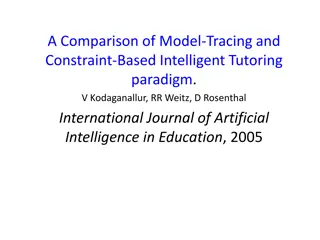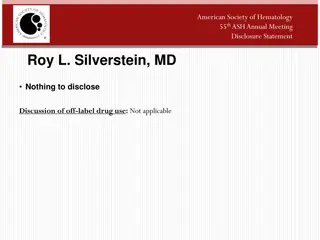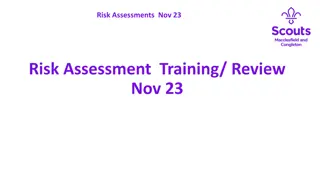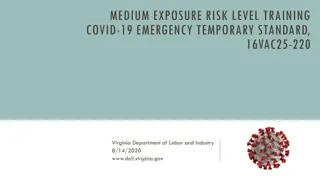Comprehensive Overview of Security Risk Analysis and Management
Explore the essential aspects of security risk analysis and management, including risk identification, assessment, and control techniques within an Information Security (InfoSec) context. Learn about the purpose of risk management, steps involved in a risk management plan, asset identification and c
0 views • 22 slides
Risk Management in Environmental Geography and Disaster Management
Risk management in environmental geography and disaster management involves assessing the potential losses from hazards, evaluating vulnerability and exposure, and implementing strategies to mitigate risks. It includes calculating risk, dealing with risk through acceptance, avoidance, reduction, or
2 views • 10 slides
Introduction to Flood Risk Assessment with HEC-FDA Overview
This presentation delves into flood risk assessment using HEC-FDA software, covering topics such as defining flood risk, components of uncertainty, consequences of flood risk, and methods to assess flood risk including hydrology, hydraulics, geotechnical, and economics. It explores the intersection
7 views • 39 slides
Funding Outcomes Remediation Process in Higher Education and Science Innovation
A detailed account of the remediation process undertaken by the Portfolio Committee on Higher Education, Science, and Innovation concerning funding outcomes for students. Issues such as processing gaps, hybrid applications, and missing parental relationships led to a review of funding decisions. The
3 views • 24 slides
Operational Risk Assessment for Major Accident Control: Insights from IChemE Hazards 33 Conference
This content provides valuable insights into the importance of Operational Risk Assessment (ORA) in managing major accident risks in high hazard industries. It covers the necessity of ORA, identifying changes, risk assessment, and key success factors. Real-life examples like the Buncefield Terminal
1 views • 22 slides
Challenges and Solutions in Legacy Waste Management and Dumpsite Remediation in India
Legacy waste and dumpsites in India pose significant environmental and health hazards due to mismanagement over decades. The presentation highlights current status, composition of waste fractions, remediation approaches like bio-capping and biomining, challenges faced, and the role of initiatives li
0 views • 22 slides
Country Risk Analysis in International Business
Country risk analysis is crucial for multinational corporations (MNCs) to assess the potential impact of a country's environment on their financial outcomes. It includes evaluations of political and economic risks in foreign operations. Sovereign risk, political risk characteristics, and factors are
1 views • 61 slides
Project Risk Management Fundamentals: A Comprehensive Overview
Project risk management involves minimizing potential risks and maximizing opportunities through processes such as risk management planning, risk identification, qualitative and quantitative risk analysis, risk response planning, and risk monitoring and control. Quantitative risk analysis assesses t
0 views • 41 slides
Fundamentals of Portfolio Management and Risk Aversion in Investing
Portfolio theory is based on the principles of maximizing returns for a given risk level, considering all assets owned. Investors typically exhibit risk aversion, preferring lower risk assets for similar returns. Risk is defined as future outcome uncertainty. Markowitz Portfolio Theory highlights th
2 views • 17 slides
Advanced Technology for Soil Contamination Remediation
The proposed technology utilizes a High Vacuum, Low Temperature Thermal Desorption Process to effectively remediate contaminated soil, achieving targeted mercury levels in an environmentally friendly manner. Key features include dry processing, no emissions into air or water, electronic control syst
0 views • 10 slides
Human Health Risk Assessment due to High Concentrated Arsenic in Groundwater
This term paper focuses on assessing human health risks associated with elevated levels of arsenic in drinking groundwater. Various exposure routes and sources of arsenic contamination are investigated, leading to a comprehensive risk assessment. The results indicate non-carcinogenic effects and pot
0 views • 6 slides
Risk Management Strategies in Organizational Security
Exploring risk management in organizational security, this study guide delves into resiliency, automation strategies, policies, and procedures to reduce risk. It covers threat assessments, computing risk assessments, qualitative vs. quantitative risk measurements, and actions based on risk assessmen
2 views • 19 slides
Strategies for Effective Teaching and Remediation in Education
Explore the education process, teaching methods, and remediation strategies in the field of psychiatry and behavior sciences. Learn how to identify learners needing remediation, diagnose deficits, create remediation plans, and assess effectiveness. Dive into group discussions, review experiences, te
0 views • 50 slides
Thin Line of Remediation in PA Education
Explore the challenges and goals of remediation in physician assistant (PA) education, delving into the importance of addressing deficiencies while avoiding spoon-feeding. Learn how to align institutional principles with remediation strategies to provide second chances for students with diverse need
0 views • 18 slides
Professional Mold Remediation Solutions Services
We offer mold remediation service involves a series of steps that enable us to perform a thorough process Work with MSI today for professional mold solutions. \/\/ \/services\/mold-remediation
0 views • 16 slides
Eco-Remediation Goals Development Training Overview
This presentation by Mark Sprenger from the U.S. EPA discusses the development of Ecological Preliminary Remediation Goals (PRGs). It covers the process steps, assumptions, risk information activities, and resources related to ecological risk assessment within the EPA's programs. The training module
0 views • 53 slides
Lead Poisoning Investigation and Remediation in Child-Occupied Facilities
Explore the protocols and requirements for lead investigations, remediation efforts, routine sanitation inspections, and monitoring in child care centers and schools to ensure the safety of children from lead hazards. Learn about lead poisoning thresholds, hazard identification, XRF testing, and mor
0 views • 25 slides
Analysis of Florida Keys Canal Remediation Diel Results
The analysis focuses on the diel results of a canal remediation project in the Florida Keys as of 11/01/2016. It includes measurements of %DO saturation above 42% and the average %DO saturation over a full day, with data points on control and remediated surfaces. Significant improvements are observe
0 views • 18 slides
Regulatory Changes and Quality Improvement in October 2018
The content discusses regulatory changes related to risk and quality improvement in October 2018, focusing on serious incidents, reporting requirements, risk management, and monitoring service quality. Providers are mandated to review, analyze trends, identify systemic issues, recommend remediation,
0 views • 31 slides
Transforming Remediation: A Course for the 2014-2015 Academic Year
Barbara Brown, Assistant Vice Chancellor for Transitional and General Education, outlines the journey towards transforming remediation in education. The plan involves task forces, ad hoc committees, regional workshops, and policy committees. The focus is on corequisite remediation, where students re
0 views • 25 slides
Risk Concepts and Management Strategies in Finance
Explore the essential concepts of risk in finance, such as risk definition, risk profiles, financial exposure, and types of financial risks. Learn about risk vs. reward trade-offs, identifying risk profiles, and tools to control financial risk. Understand the balance between risk and return, and the
0 views • 18 slides
Risk and Return Assessment in Financial Management
This comprehensive presentation explores the intricacies of risk and return assessment in the realm of financial management. Delve into understanding risk concepts, measuring risk and return, major risk categories, and the impact of risk aversion on investment decisions. Gain insights into the manag
1 views • 62 slides
Risk Management and Security Controls in Research Computing
The European Grid Infrastructure (EGI) Foundation conducts risk assessments and implements security controls in collaboration with the EOSC-hub project. The risk assessments involve evaluating threats, determining likelihood and impact, and recommending treatment for high-risk threats. Results from
1 views • 13 slides
Risk Management & MPTF Portfolio Analysis at Programme Level for UN Somalia
This session delves into the world of risk management and portfolio analysis at the programme/project level, specifically focusing on the Risk Management Unit of the United Nations Somalia. It covers enterprise risk management standards, planned risk management actions, the role of RMU, joint risk m
0 views • 30 slides
Alcohol and Cancer Risk: Understanding the Links
Alcohol consumption is linked to an increased risk of various cancers, including mouth, throat, esophagus, breast, liver, and colorectal cancers. Factors such as ethanol, acetaldehyde, nutrient absorption, estrogen levels, and liver cirrhosis play a role in this risk. Even light drinking can elevate
0 views • 17 slides
Skills for Successful Remediation of Underperforming Trainees
In this resource, Trish Kritek, MD, EdM, from the University of Washington, and Timothy Gilligan, MD, MS, from the Cleveland Clinic, share insights on remediation strategies for underperforming trainees. Key concepts include focusing on outcomes, providing structure and accountability, honing commun
0 views • 30 slides
UW IT Accessibility - PDF Practices and Tools
UW-IT's Accessible Technology Services department at the University of Washington outlines their in-house PDF remediation practices, tools used, handling of complex forms, and available resources for PDF accessibility. They utilize tools like Adobe Acrobat Pro DC, ABBYY FineReader, PAC 2021, and JAW
0 views • 6 slides
Risk Concepts in the Mathematics Classroom
Risk is a concept integral to decision-making in various aspects of life. This resource explores how risk is defined in the real world, its relevance in the classroom, and strategies for teaching risk literacy to students. It delves into the multiple definitions of risk, risk analysis, and the emoti
0 views • 62 slides
Enhancing Communication and Remediation Strategies in Medical Education
This content explores diagnosing errors in communication and designing remediation plans in medical training. It covers topics such as coaching plans for millennials, remediation assessments, and case studies like Tim, a first-year fellow facing interpersonal challenges. Strategies for addressing de
0 views • 15 slides
Organizational Risk Appetite and Tolerance
Explore the development of market risk appetite goals and how to define and establish organizational risk tolerance. Learn about the Classic Simplified View of Risk Tolerance and different methods to determine risk appetite. Discover the importance of assessing market risk impact and aligning risk t
0 views • 8 slides
Developing a Risk Appetite Culture: Importance and Framework
Risk management plays a critical role in the success of corporations, with strategy and risk being intertwined. This presentation delves into definitions of key terms such as risk appetite, the Risk Appetite Cycle, characteristics of a well-defined risk appetite, and the importance of expressing ris
0 views • 31 slides
Security Planning and Risk Management Overview
This content provides an in-depth exploration of managing risk, security planning, and risk appetite in the context of cybersecurity. It covers essential concepts such as risk management process, threat types, risk analysis strategies, vulnerability assessment, and risk mitigation techniques. The ma
1 views • 73 slides
Green Remediation and Green Infrastructure for a Cleaner Future
Addressing environmental challenges through green remediation and infrastructure practices, focusing on reducing environmental footprints, incorporating sustainability elements, and utilizing greener cleanup techniques like native grass species and biobased products. The ASTM guide provides a standa
0 views • 8 slides
Risk Factors Analysis: Identifying At-Risk Students Before They Reach Campus
Risk Factors Analysis aims to identify students at risk of attrition before they even arrive on campus by evaluating academic, financial, minority, and first-generation factors. The method involves choosing specific risk factors, tracking historical prevalence, calculating relative risk, and predict
0 views • 15 slides
Comparison of Model-Tracing and Constraint-Based Intelligent Tutoring Paradigm
Model-Tracing Tutor (MTT) and Constraint-Based Model Tutor (CBMT) differ in feasibility based on solution information richness and goal structure complexity. MTT excels in targeted remediation but demands higher development effort. CBMT is more suitable for information-rich domains. The choice betwe
0 views • 20 slides
Addressing Faculty Remediation Challenges in Medical Education
This content discusses strategies for identifying faculty members in need of remediation in medical education settings, emphasizing the importance of timely feedback and assessment. It covers topics such as setting clear expectations, recognizing when faculty fall short as role models, and practical
0 views • 23 slides
Environmental Remediation Using Silica/Silicates for Contaminant Oxidation
Utilizing silica and silicates as chemical oxidants in environmental remediation has been approved under the general WDR permit since 2010. With over 1,500 applications in the US and Canada, including 148 in California, these substances are known for their safety and effectiveness in contaminant oxi
0 views • 8 slides
Risk-Based Permission Model for Smart Homes
Smart homes offer convenience and efficiency but also present security risks. The Tyche risk-based permission model addresses vulnerabilities in smart home platforms, emphasizing the importance of balancing security and usability. By grouping device operations based on risk levels, such as fire haza
0 views • 20 slides
Comprehensive Risk Assessment Training Overview
In this risk assessment training session held on November 23, participants reviewed the process of writing and reviewing risk assessments to enhance the quality of assessments for safer scouting experiences. The training aimed to improve leaders' skills and confidence in risk assessment practices wh
0 views • 37 slides
Workplace Exposure Risk Levels Training and Standards Overview
This content provides detailed information on exposure risk levels in the workplace, including medium, low, high, and very high risk classifications. It explains the requirements and training needed for each risk level, as well as how to determine exposure risk levels based on tasks, work environmen
0 views • 25 slides

